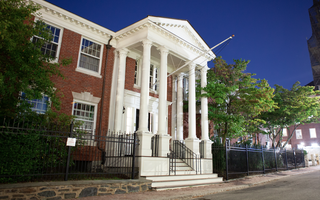{shortcode-9fa61103f55384c7cce32df19ff04fbc79fba8e7}
Computer Science professor and former Dean of the College Harry R. Lewis ’68 sharply condemned Harvard’s sanctions on members of single-gender social groups in a letter he sent to the House Committee on Education and the Workforce Wednesday.
Lewis — who has long served as a staunch and vocal opponent of the sanctions — wrote in the letter that the roughly two-year-old penalties have led to the “erosion” of Harvard students’ freedom of speech, expression, and association. He argued College administrators are effectively “coercing” single-gender final clubs and Greek organizations to go gender-neutral.
“Harvard claimed a right to align students’ thinking on social matters with its own,” the letter states. “As enacted, the sanctions have nothing to do with students’ conduct, only with their alleged betrayal of Harvard’s ‘deepest values’ by joining a single-gender club.”
Lewis submitted the missive for consideration as part of a hearing held Wednesday morning in Washington by members of the Education and the Workforce committee. The hearing, which lasted for two hours, was meant to examine the First Amendment and whether institutions of higher education are protecting students’ rights. Speakers included Representative Virginia A. Foxx, a North Carolina Republican who recently proposed a new higher education law that would imperil Harvard’s ability to enforce its controversial sanctions.
{shortcode-71a4fd002ea2c97e56aeb4180758ffeb7a4f7264}
The penalties, which took effect with the Class of 2021, bar members of single-gender final clubs and Greek organizations from campus leadership positions, varsity athletic team captaincies, and from receiving College endorsement for certain prestigious fellowships. Since administrators debuted the penalties in May 2016, at least 15 formerly single-gender social groups have vowed to go co-ed and, in return, have received Harvard recognition and exemption from the sanctions.
Though she declined to comment on the specifics of Lewis’s letter, Harvard spokesperson Rachael Dane broadly defended the sanctions in an emailed statement Wednesday.
“Harvard seeks to create a community where students have the fair opportunity to engage in curricular and extracurricular activities regardless of their gender, socioeconomic status, or other attributes unrelated to merit,” she wrote.
Lewis wrote in the letter that he believes the College would benefit from some form of congressional intervention. He declined to specify exactly how he wants legislators to act, though.
“I am no fan of government interference with private universities, but Harvard needs a civics lesson,” he wrote.
One possible “lesson” could come in the form of Foxx’s higher education law — the PROSPER Act, which she proposed as an update to the Higher Education Act. The bill, currently under consideration by the House of Representatives, contains a clause that could prevent colleges and universities that penalize members of single-gender social groups from receiving federal funding.
The PROSPER Act in its current form likely would not affect Harvard. But opponents of the sanctions hope to change the wording of a provision in act to ensure it applies to the University.
In recent months, several undergraduate and graduate members of final clubs and Greek organizations have traveled to Capitol Hill to lobby for the legislation and against the sanctions.
The Fraternal Government Relations Coalition — a group involved in that lobbying effort — also penned a letter to the congressional committee Wednesday. It, too, argued that Harvard has gone too far and that Congress must step in.
“We urge you to consider how Congress can play a part in protecting every student’s freedom of association rights, in particular a student’s ability to join the student organizations of their choosing, including single-sex organizations,” the Coalition’s letter reads.
Dane wrote in her emailed statement that Congress “should not be seeking to regulate student life at private institutions.”
The sanctions have only recently attracted the attention of Congress — but they have roiled Harvard’s campus for years, drawing student protests, faculty backlash, and two separate attempts by groups of professors to pass motions cancelling the penalties.
Lewis spearheaded both efforts to kill the sanctions. He — along with 11 0ther faculty — first filed a Faculty of Arts and Sciences motion in May 2016 declaring that “Harvard College shall not discriminate against students on the basis of organizations they join.”
He withdrew that motion in Jan. 2017 after Harvard administrators formed a faculty committee and charged it with reviewing and possibly revising the sanctions. In its final report, that committee did not propose any major changes to the penalties, prompting Lewis to file a second motion in Aug. 2017 — this time alongside 20 other professors — that once again sought to nullify the sanctions.
The faculty voted down that motion 130-90 in Nov. 2017.
—Staff writer Caroline S. Engelmayer can be reached at caroline.engelmayer@thecrimson.com. Follow her on Twitter @cengelmayer13.
—Staff writer Michael E. Xie can be reached at michael.xie@thecrimson.com. Follow him on Twitter @MichaelEXie1.
Read more in News
Yale Joins Harvard as Target of Federal Probe Into Alleged Discrimination Against Asian-AmericansRecommended Articles
-
 Former College Dean Attacks Social Group Penalties in Washington Post Op-Ed
Former College Dean Attacks Social Group Penalties in Washington Post Op-Ed -
 Social Groups Spent $90,000 Lobbying Congress to Cancel Sanctions in Second Quarter of 2018
Social Groups Spent $90,000 Lobbying Congress to Cancel Sanctions in Second Quarter of 2018 -
 The College Must Account for the Effects of Its Sanctions
The College Must Account for the Effects of Its Sanctions -
 Owl Club Hosts First Openly Publicized Punch Event
Owl Club Hosts First Openly Publicized Punch Event -
 Khurana 'In Dialogue' With Some Remaining Single-Gender Groups About Going Co-Ed
Khurana 'In Dialogue' With Some Remaining Single-Gender Groups About Going Co-Ed













